Items
Subject is exactly
News coverage
-
 2021-03-09
2021-03-09Long Live My Mama
I feel like my mama story needs to be heard. We loss millions of people to it . -
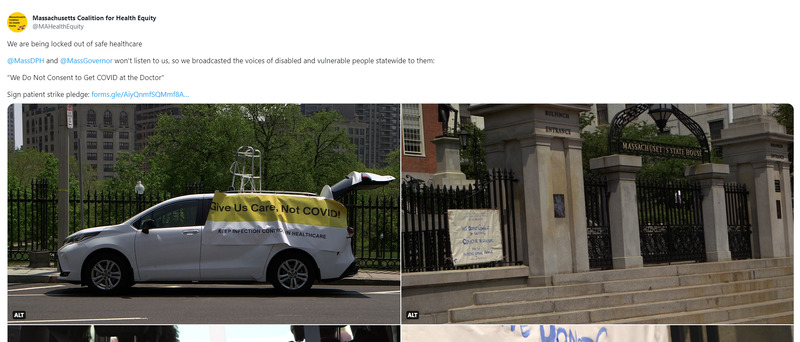 2023-05-14
2023-05-14Pandemics are Not "Great Equalizers" - Comparing COVID-19 to the Bubonic Plague Outbreak of 1870-1905
With the designation of COVID-19 as a "public health emergency" by the Centers for Disease Control and Prevention (CDC) ending as of May 11, 2023, public healthcare facilities throughout the US are rolling back protections they once employed to try to keep people safer during this ongoing pandemic. So, as this unit asks of us students, are pandemics the “great equalizers” in terms of social inequalities, and is there more equality now that the "emergency" has been deemed to be over? I argue that this is not the case, as immune compromised and disabled people have been more or less left for dead. A huge swath of healthcare facilities have removed mask mandates for care providers and hospital visitors, which leaves vulnerable and immune compromised people at a much higher risk of getting COVID-19 while receiving the medical care that is necessary for them to manage their conditions. In response, people and organizations, such as the Massachusetts Coalition for Health Equity in the tweet above, have begun to mobilize in favor of maintaining COVID-19 protections in healthcare settings by organizing strikes, protests, petitions, and phone banks to public officials. The reasons for maintaining COVID precuations such as mask mandates, access to COVID tests, and enhanced filtration in healthcare settings are clear. As the Massachusetts Coalition for Health Equity describes in their petition titled "Patient Strike Authorization Vote," the CDC "advises immunocompromised people to avoid crowded indoor settings, which now includes all healthcare institutions without universal masking," essentially maintaining that COVID is dangerous to immune compromised people while giving them no option but to risk exposure if they want to receive their necessary healthcare (Patient Strike Authorization Vote). The petition text explains that "[n]ational leaders in hospital epidemiology argue that universal masking should become the new standard of care, as gloves became with HIV" in order to keep people with compromised immune systems such as young children and elders safe (Patient Strike Authorization Vote). Currently, disabled and immune compromised people "are being locked out of safe healthcare" and are facing discrimination that makes them unwelcome and unsafe in healthcare settings (Massachusetts Coalition for Health Equity). In order to relate this modern COVID-19 pandemic to our course materials and demonstrate that discriminatory treatment during times of disease is not new, I will compare the above post to points from the text "The Chinese as Medical Scapegoats In San Francisco, 1870-1905" by Joan B. Trauner. This text discusses the discrimination against Chinese and other East Asian people living in San Francisco's Chinatown during a bubonic plague outbreak in the late nineteenth century. Sinophobic and anti-Asian sentiments, similar to those that arose during the epidemic Trauner details, have also been evident throughout the COVID-19 pandemic, so much so that even US President Donald Trump referred to COVID-19 as the "China virus." Ableism has also been prevalent throughout the COVID pandemic, as many people no longer care about the effects of the virus, because it harms disabled and immune compromised people most, especially people who also face racial discrimination in healthcare. Trauner explains that, because white people in the US believed the plague primarily affected Chinese and other Asian people, and because plagues were bad for business,"[t]he governor of California, Henry T. Gage, and executives of big business and of the large railroads, in conjunction with the San Francisco Board of Trade, the San Francisco Chamber of Commerce, and the Merchants Association, were all determined to prove that the plague did not exist in San Francisco" (78). The author of the Patient Strike Authorization Vote argues that today, we see a similar pro-business sentiment that comes at the expense of immune compromised people who are more likely to get sick with and die from COVID-19, writing: "Hospitals that remove masks and surveillance testing are making a value judgement about our lives, because they want to preserve their profit margins" (Patient Strike Authorization Vote). The CDC's ending of the COVID-19 public health emergency designation and the resulting halt of COVID mitigation procedures indicate that people are ignoring the needs of immune compromised people so that everyone can feel more comfortable going "back to normal" and maintaining consumption habits that are desired by businesses. Additionally, in both the past plague outbreak and the current pandemic, public health officials have shown hesitancy to give people vital information, which has led to harm. As Trauner explains, during the bubonic plague epidemic, "San Francisco Mayor Eugene Schmitz refused to approve the printing of health reports and vital statistics and even attempted to remove from office four members of the Board of Health who persisted in stating that plague existed in San Francisco" (79). Today, because the public health emergency designation ended on May 11th, 2023, the CDC is "no longer reporting aggregate cases and deaths, COVID-19 Community Levels, COVID-19 Community Transmission Levels, or COVID-19 Electronic Laboratory Reporting (CELR) data," all of which have been used to determine the severity of the situation throughout the pandemic (COVID Data Tracker). Meanwhile, over one thousand people are dying of COVID every single week, but COVID transmission levels are not being tracked, so people cannot know how many COVID positive cases there are in their county and how likely they are to contract the virus by going out in public (COVID Data Tracker). Another similarity between the COVID-19 pandemic and the bubonic plague outbreak of the late nineteenth century lies in the responses of the people facing discriminatory treatment in public health settings during these respective disease outbreaks. Trauner writes that before, during, and after the bubonic plague outbreak, Chinese businesses and health practitioners constructed and operated their own hospitals that would treat the people of Chinatown, because they were not welcome at other hospitals due to racial discrimination (81). Trauner explains that "[e]arly Chinese immigrants realized the necessity of banding together and providing for their own health care needs," in light of the government abandoning their health needs (81). Activists and organizations like the Massachusetts Coalition for Health Equity are currently banding together and fighting to get better and safer care for immune compromised people during the COVID-19 outbreak, as they are also facing discrimination at hospitals rolling back COVID precautions, because these spaces are not safe for them. The organizing they are doing to try to make healthcare settings safer for immune compromised people looks different, as no one is proposing the creation of immunocompromised-specific hospitals. They are fighting for better treatment, still, using slogans like "We Do Not Consent to Get COVID at the Doctor," and urging people that "[w]e must take collective action to prevent this mass violation of our human rights and federal rights to safe care," as stipulated under the Americans with Disabilities Act (Massachusetts Coalition for Health Equity). In both disease outbreaks, it has been the duty of those being discriminated against to take care of and advocate for themselves. So, in fact, pandemics are not "great equalizers"; in reality, they not only make pre-existing inequities even more visible, but exacerbate them even further. As Trauner argues, "Health policy [...] manifests not only the state of the medical sciences, but the expectations and the value system of society-at-large," and as such, if society-at-large is racist and ableist, then the health policies put into place will reflect these discriminatory values (70). These governmental measures come at a cost to everyone, and especially those facing racist and ableist discrimination. Had the nineteenth-century bubonic plague outbreak been determined an emergency and treated as a serious threat in spite of sinophobic and anti-Asian sentiments, perhaps more research could have been carried out sooner, and more lives could have been saved. If people in the US continue to take the COVID-19 pandemic seriously and not dismiss the pleas of immune compromised and disabled people to continue precautions, perhaps loss of life and further disablement from COVID infection can be mitigated. -
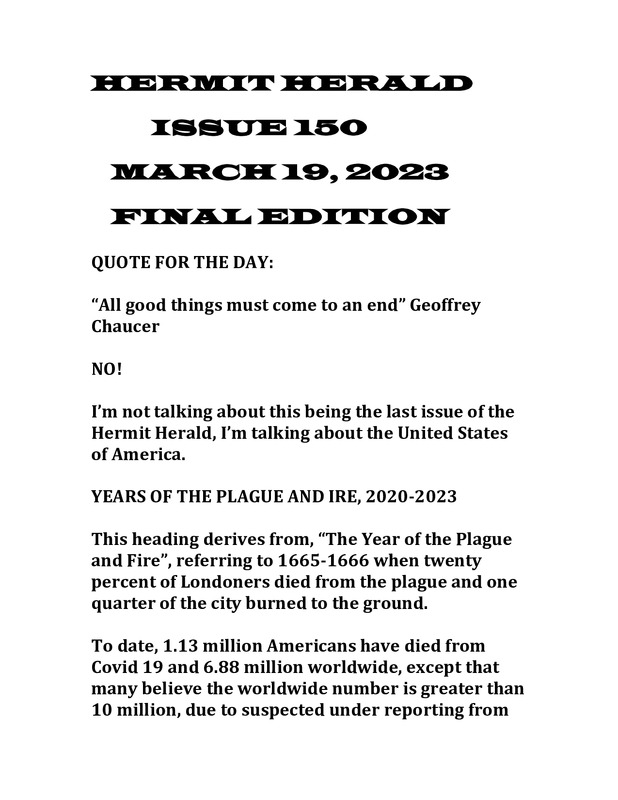 2023-03-19
2023-03-19HERMIT HERALD, ISSUE 150
Final issue, a three year review -
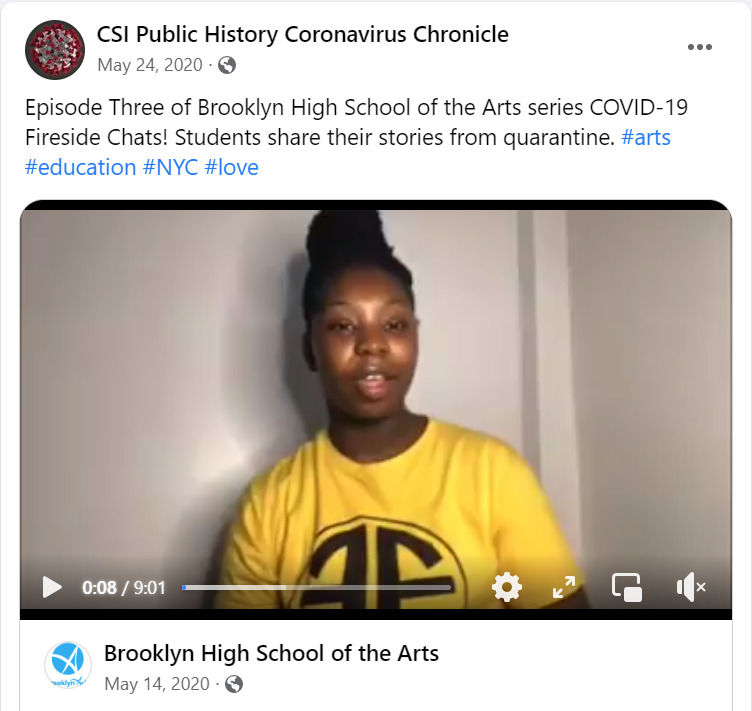 2020-05-24
2020-05-24Fireside Chat Episode 3
Episode Three of Brooklyn High School of the Arts series COVID-19 Fireside Chats! Students share their stories from quarantine. -
 2022-08-19
2022-08-19HERMIT HERALD, ISSUE 144
TRUTH AND LIBERTY SUBJECTIVE -
 2021-12-28
2021-12-28Pharmacy Technician Shortages
This NBC article goes into detail about the shortage of pharmacy technicians as a result of COVID-19. Drug shortages, staffing shortages, increased demand, and additional responsibilities with little to no training or compensation led to burnout. -
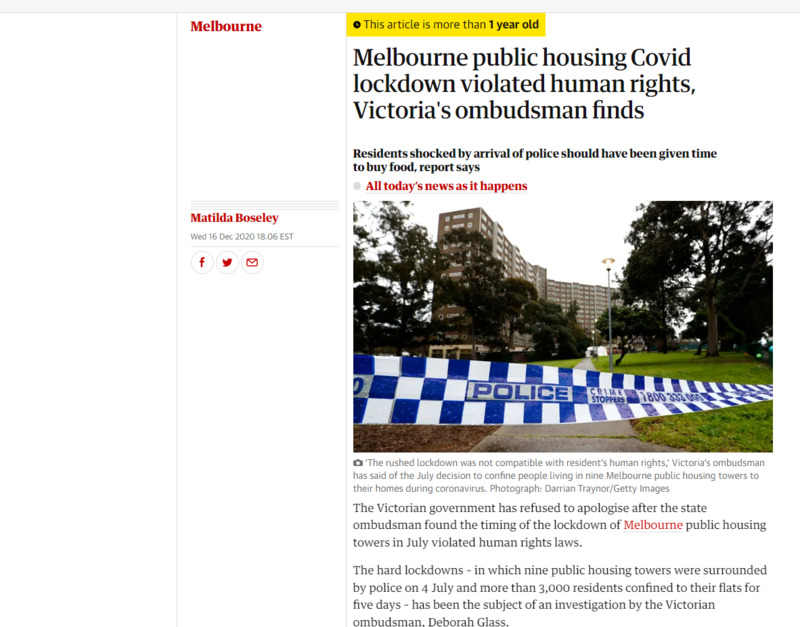 2020-07-04
2020-07-04The North Melbourne Public Housing Lockdown
HIST30060: Just before the second lockdown in Melbourne I was told by my mum that my grandfather and step grandmother had been suddenly without warning placed into a sharp lockdown within the public housing they resided in. The confusion and anger was quickly shared by my family and extended family members, where was the consideration for some of the most vulnerable members of the community, who in some cases cannot speak english? Why were they subject to such harsh conditions whilst those in the wealthy inner east free to enjoy themselves despite their equally high rates of covid? This was noticed by me as well in the harsher treatment of those in the poorer, diverse suburbs of Sydney and Melbourne during some of the worst times of the pandemic. -
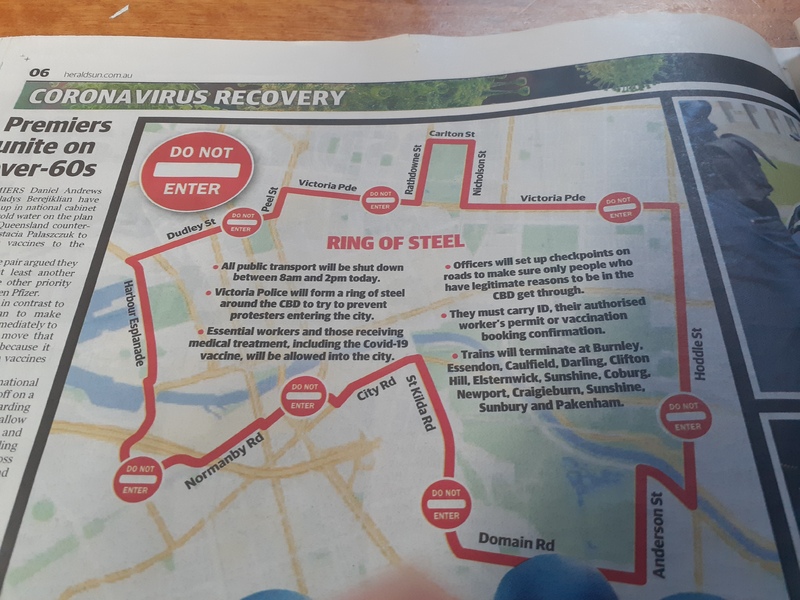 2021-09-18
2021-09-18The ring of Steel
This photo shows a newspaper article published during Melbourne's 2021 lockdown. Following significant anti-lockdown protests in the CBD, the police enacted a 'ring of steel' around the CBD to prevent further protests. I was actually turned around at one of the checkpoints (unaware that the city had been shut) earlier that morning on my morning run. This was one of the most dystopian moments from the whole pandemic and highlighted the lengths the government was willing to take to stop the protests in Melbourne. -
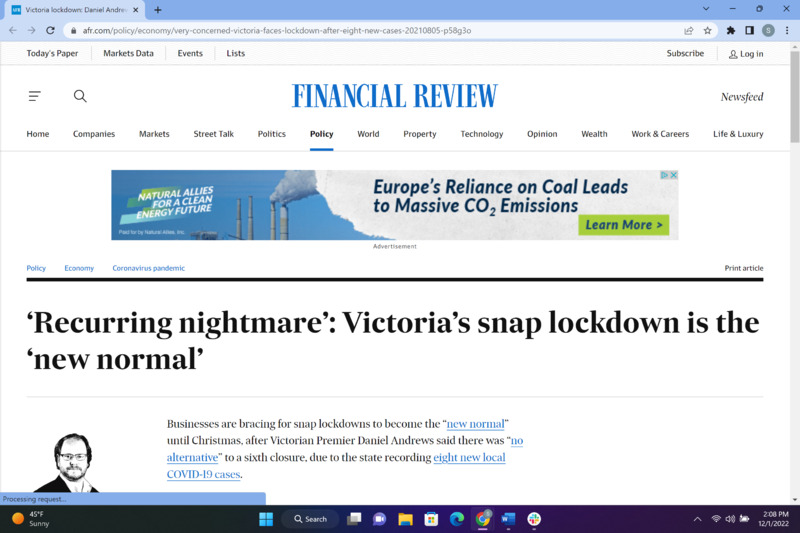 2022-10-30
2022-10-30Silenced voices of the commoner
The recent Covid-19 pandemic has had immense local and global ramifications, especially for us Victorians who have experienced the world’s longest lockdowns. It was a significant worldwide event which will certainly be looked back upon by future generations, just as we have analysed previous historical diseases, such as the bubonic plague. But how should archivists determine which sources, and likewise which voices should be permanently preserved within the historical record? Traditionally, an archive is a collection of documents that archivists have selected to be permanently preserved as sources for future historical or other forms of research. Initially, only scholars with an ambition to conduct historical research had access to archives, but their digitisation and free nature have ensured that anyone is able to access the documents they contain online. However, the process of creating both physical and digital archives is inherently flawed. Archivists have a formidable power to evaluate which sources are “worthy of inclusion”, and simultaneously which ones are not; essentially what compromises the historical record. Therefore, although archivists are characterised as unbiased and impartial individuals, they are inextricably influenced by “societal biases” in their decision-making, as they simply have to select what they personally believe will have value to future researchers. It has culminated in them privileging and prioritising the voices of individuals within positions power, which has indefinitely created “gaps within the historical record” through inhibiting the voices of those without it. Rodney G.S. Carter echoes the problem in asserting that the existence of archival “silences” is the “manifestation of the actions of the powerful”, which has a substantial impact on how marginalised groups produce and likewise form both social history and memory. Ariella Aïsha Azoulay has cautioned readers that “digital archives are no exception”. With this in mind, if we consider the 19-month impact of the pandemic upon Victoria, I am certain that archivists will acknowledge the voices of those within positions of power when determining what sources should be preserved. Of particular importance would be those of primary actors that shaped Victoria’s lockdown experience, most importantly the protagonist of the lockdowns, Premier Daniel Andrews (fig.1). Figure 1. Video of Premier announcing sixth lockdown, cited in Patrick Durkin, “’Recuring nightmare’: Victoria’s snap lockdown is the ‘new normal,’” Financial Review, August 5, 2021, URL: https://www.afr.com/policy/economy/very-concerned-victoria-faces-lockdown-after-eight-new-cases-20210805-p58g3o. I am aware of the threat of “information overload” both real and digital archives currently face with an abundance of available sources, but I would argue that the preservation of major political statements alongside previously supressed voices would be beneficial to any archive created surrounding the Victorian Covid-19 experience. A consideration of the experiences of marginalised voices would be imperative to a future historian, as it would enrich historiography by offering insight into the social-political dynamics of the event, and its psychological impact beyond official government and political documents. I will now consider the value of this “bottom-up approach” in capturing the Victorian pandemic experience from the viewpoint of the common man, me, a historically marginalised group within the realm of archives. I personally wasn’t too concerned about the first lockdown and its stage three and four restrictions as they would “flatten the curve” of infectious cases, providing our health system with the best opportunity to tackle the fast-spreading virus. Life as we know it changed though with only four reasons to leave home; shopping, exercise, caregiving, and work. The café I worked at had to shift to “take away only”, as many others (fig.2). Figure 2. The Food Republic Café, “covid update for customers,” Blackburn, March 23, 2020, URL: https://www.facebook.com/thefoodrepubliccafe. I was still able to work alongside my barista colleague and friend Max which was pretty good, and I was able to perfect my coffee artwork (fig.3). Figure 3. The Food Republic Café, “promotional post during lockdown 1” Blackburn, April 8, 2020, URL: https://www.facebook.com/thefoodrepubliccafe. I was also able to continue exercising and riding my bike, but I wasn’t able to see or visit any friends or family, which initially seemed like a fair sacrifice to make for the health and wellbeing of all Victorians (fig.4). Figure 4. George Vesnaver, Selfie on bike ride, April 10, 2020, photograph, Main Yarra Trail, Melbourne. However, after being continuously plunged in and out of lockdowns by the time the sixth one came about, I was very angry to say the least as representative within my covid journal entry (fig. 5). Figure 5. George Vesnaver, Covid Journal Entry, October 27, 2022, photograph, Kew East, Melbourne. Laura A. Millar’s observation that “the concept of evidence” must be broadened as opposed to its current restrictive and rigid format adopted by archivists has reaffirmed my belief that my experience and that of other regular people should not be forgotten. My sources may just seem like information to an archivist because of their form, but they are filled with evidence of this historic moment. Their eternal preservation within an archive would serve anyone wanting to write about the Victorian Covid-19 experience in the foreseeable future. For example, figure 2. would enable one to see how government information was disseminated via social media; the confirming and likewise conforming of political decisions. Figure 3. would reveal the way in which people adapted to Victoria’s first initial lockdown via humour, helping us remember attitudes towards the past event. Figure 4. would showcase a sense of normality during unprecedented times, through an ability to continue exercising. But most importantly the response depicted in figure 5. towards figure 1., a first-hand account of the psychological impact of the endless lockdowns instigated by those with political powers. Winston Churchill once said that “history is written by the victors”, so considering those with and without power survived the pandemic it seems only fair that all our voices should be recognised in the historical record. -
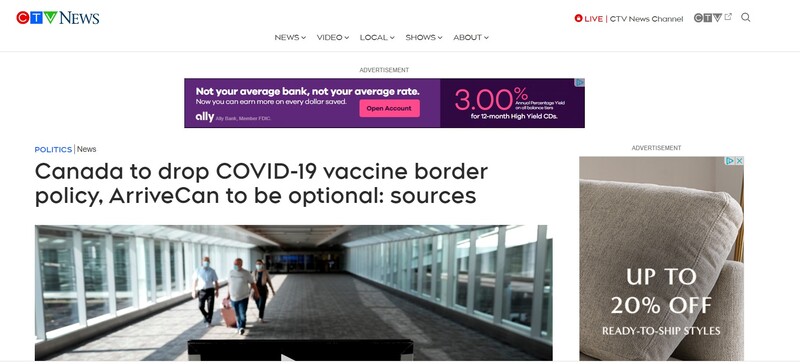 2022-09-21
2022-09-21ArriveCan application and Canada's COVID-19 vaccine border requirements
This news article reports Canada's plan to drop its COVID-19 vaccine border requirements, make the ArriveCan application optional, and possibly end COVID-19 testing for travelers by the end of September 2022. This news shows how the COVID-19 pandemic impacted travel and border relations between countries (Canada and US). -
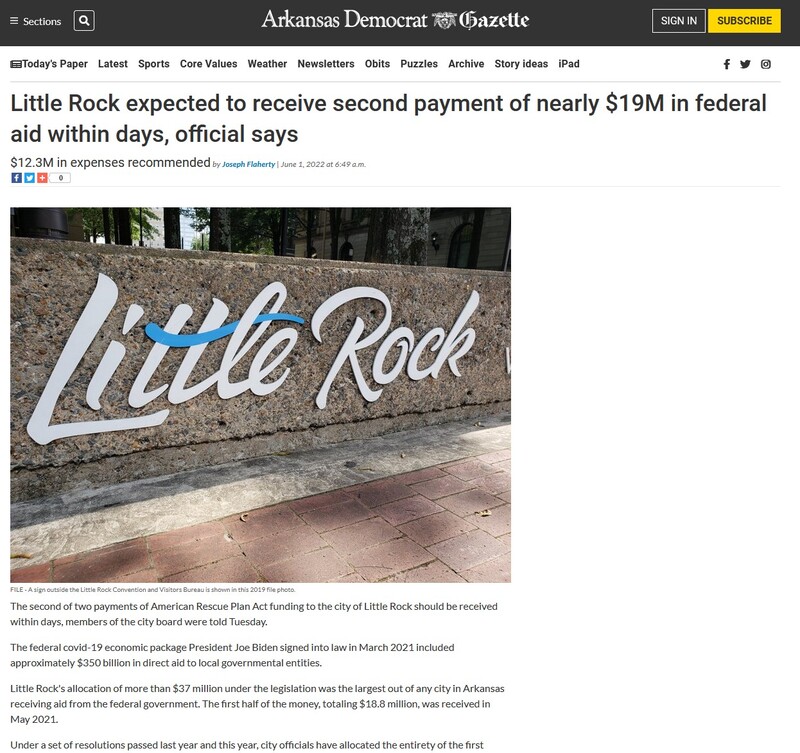 2022-06-01
2022-06-01Little Rock and Relief
This article details the $19 million dollars in aid Arkansas' capital received from the federal government. As part of the American Rescue Plan, many larger cities are receiving direct aid from the federal government and Little Rock previously received $18.8 million in May of 2021. The city has decided to allocate much of the funds to improving public works, renovations, and policing. It is interesting to see just how excessively covid impacted cities and the extreme necessity of federal aid. It is particularly beneficial when state legislatures have failed to provide money for needed refurbishment. However, payouts such as this begs the question: who will pay? -
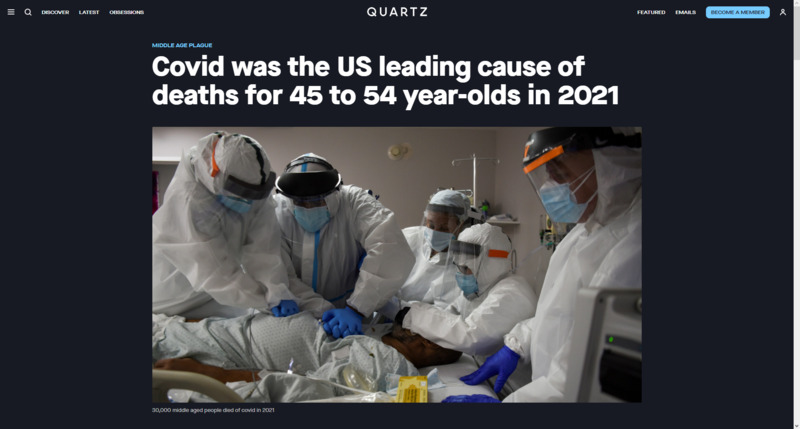 2022-07-08
2022-07-08Covid was the US leading cause of deaths for 45 to 54 year-olds in 2021
This is a news story from Quartz by Annalisa Merelli. This news story says that within the deaths that occurred between March 2020 and October 2021, the middle-aged were disproportionately affected. In the 45 to 54 age group, COVID killed more than any other leading causes of death within that time period, including heard disease and cancer. -
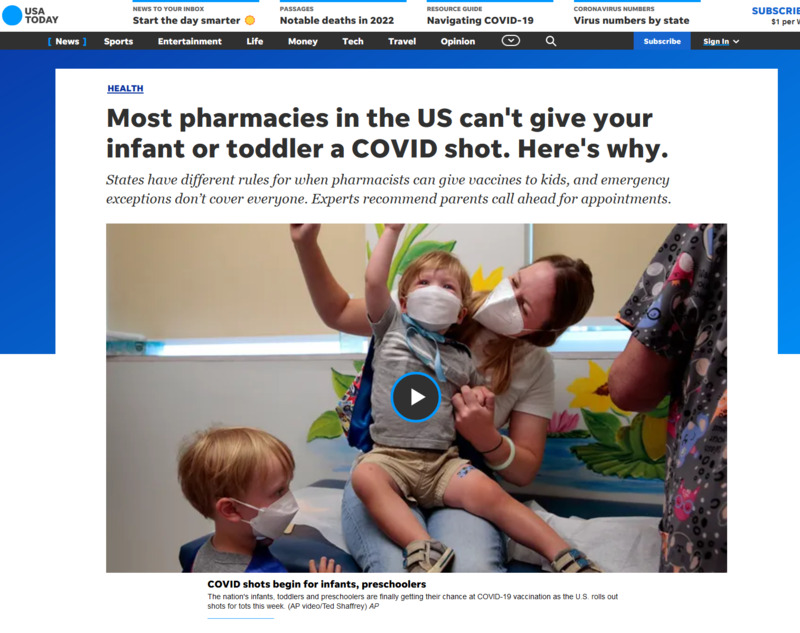 2022-06-23
2022-06-23Most pharmacies in the US can't give your infant or toddler a COVID shot. Here's why
This is a news story from USA Today by Adrianna Rodriguez. Most US pharmacies don't allow their technicians to administer the vaccine to children under five. The age in which the vaccines can be ministered to younger kids varies, with most putting a minimum of five or above. A lot of the reason administering vaccines has been restricted, according to the article, is because not enough pharmacists are trained to give shots to children that young. The overall target is smaller, and the needle even shorter, in addition to needing to calm and anxious child. This makes people hesitant to give young kids the COVID vaccine. It is recommended that if you cannot find a pharmacy that will give the shot to very young kids that you ask your pediatrician for a one-on-one appointment for the vaccine. -
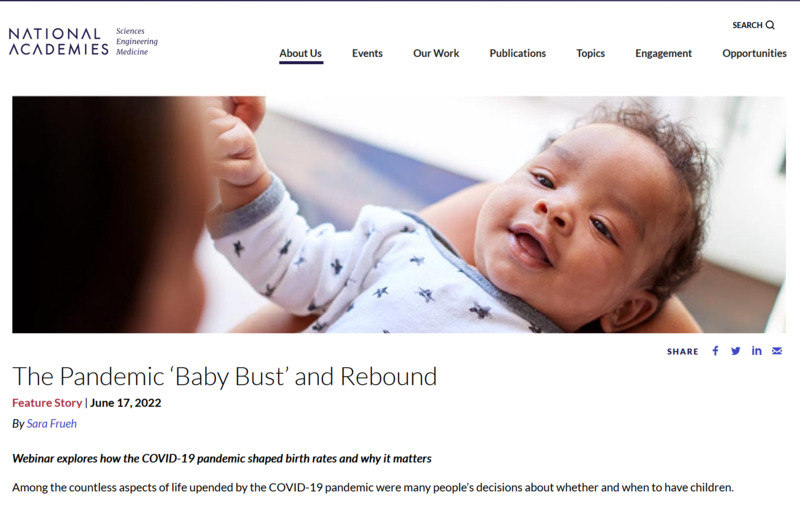 2022-06-17
2022-06-17The Pandemic ‘Baby Bust’ and Rebound
This is a news story from National Academics by Sara Frueh. It goes over the data of births throughout the pandemic. Melissa Kearney, a professor of economics at the University of Maryland, says that there was this idea at the beginning of the pandemic that it would lead to a baby boom with people being forced to stay home, but it did not. She adds that closed or limited facilities at the height of the pandemic maybe impacted some people. To support the claim, she brings up the pandemic from 1918-1919 and how that also led to decreased birth rates. An analysis of the data from Kearney states there were 62,000 fewer conceptions in the years from 2020-2021. There was a small increase in conception rates in the summer of 2020, but fell into decline again soon afterwards. The overall trend that Kearney sees with the birth and conception rates is that is has been a steady decline after COVID. -
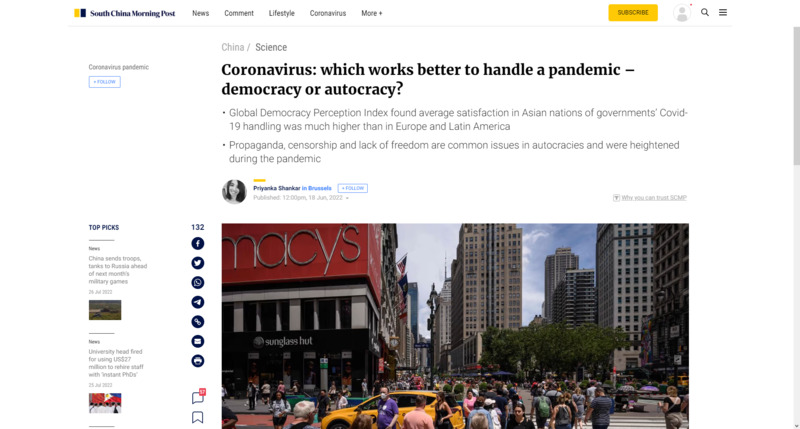 2022-06-18
2022-06-18Coronavirus: which works better to handle a pandemic – democracy or autocracy?
This is a news story from the South China Morning Post by Priyanka Shankar. This article is discussing the difference in responses based on forms of government. When it came to handling the pandemic, people from Asian countries where restrictions were much tougher rated a higher rate of satisfaction in government response compared to Latin America and Europe. This was taken from the Democracy Perception Index. According to researcher Fredrick DeVeaux, a leader in conducting this survey, the tight restrictions common in Asian countries are generally accepted because it gets associated with low death rates. The survey does make mention that in countries such as Iran and China, they hid data about the virus from their citizens, affecting their overall response to changes in lockdowns. However, Singapore is also authoritarian, and the prime minister has made an effort to create transparency in what is occurring, so items get hoarded less. Overall, the article claims that the mass mobilization of people and goods under authoritarian regimes fares better than democracies do at creating an effective COVID response. -
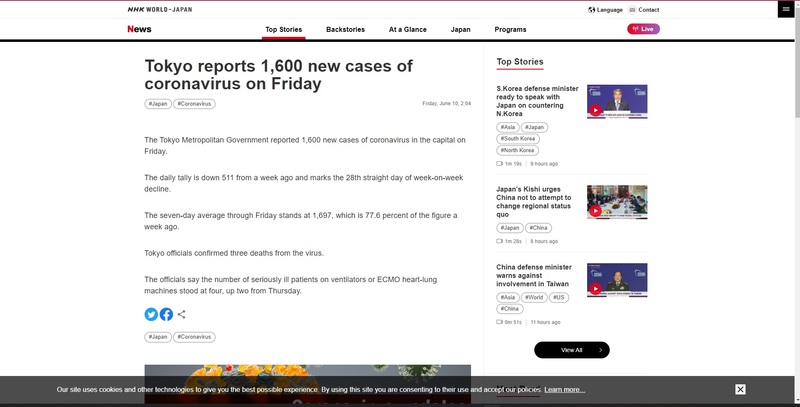 2022-06-10
2022-06-10Tokyo reports 1,600 new cases of coronavirus on Friday
This is an article from NHK World-Japan. There have been more COVID-19 cases reported in Tokyo, Japan. However, the article reports that the cases have been in decline despite these new 1,600 cases. The Japan Times website, they have a timeline that discusses the same 1,600 new cases, but also shows an Outbreak map of Japan's current cases, deaths, testing, and other things. This is a reminder that Japan is still struggling with the virus, but there is some hope with the cases decreasing weekly. -
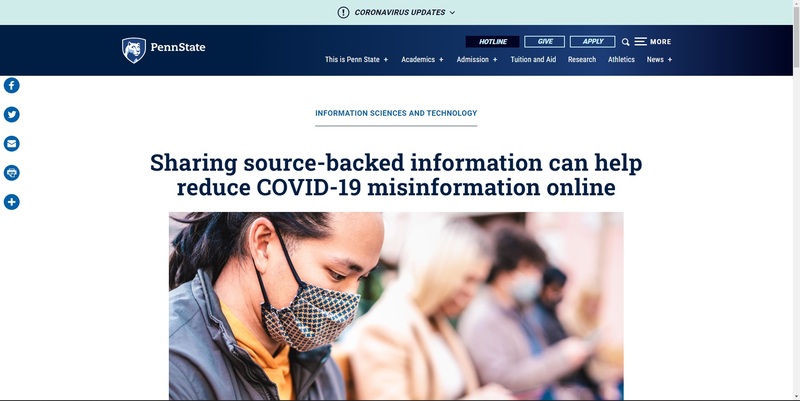 2022-06-09
2022-06-09Sharing source-backed information can help reduce COVID-19 misinformation online
This is a news story from Penn State University by Jessica Hallman. A recent study has shown that user corrections given back and forth on social media has helped reduce the spread of misinformation. Through sharing source-backed information, people were able to pick out fake news easier. -
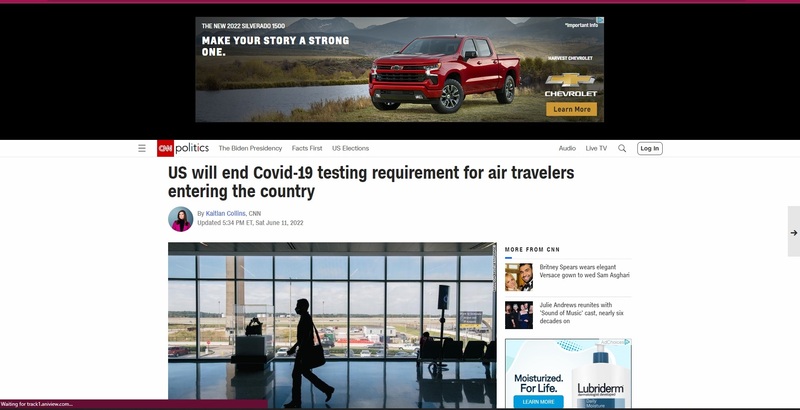 2022-06-11
2022-06-11US will end Covid-19 testing requirement for air travelers entering the country
This is a news story from CNN by Kaitlan Collins. The CDC is expected to lift the requirement for air travelers to test negative for COVID before entering the US. The travel industry has been lobbying the CDC for months regarding this issue after it was no longer determined that the restrictions are no longer "based on the science and data." However, just because it is getting lifted now, the CDC does have the power to reinstate this restriction if a new variant develops and causes concern. -
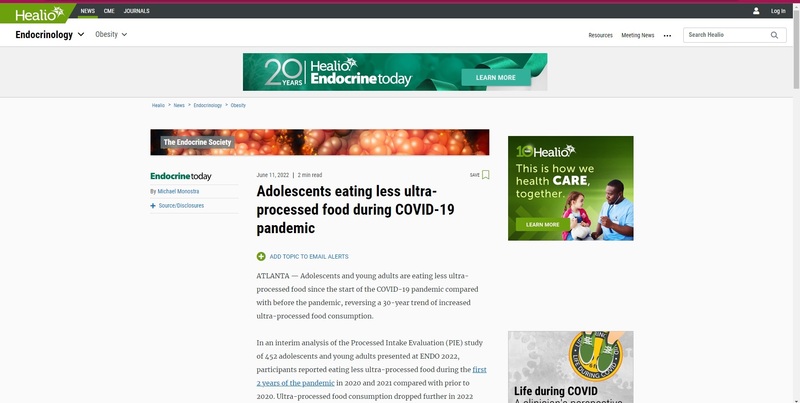 2022-06-11
2022-06-11Adolescents eating less ultra-processed food during COVID-19 pandemic
This is a news story from Healio by Michael Monostra. During the COVID pandemic, adolescents are eating less processed food. "In an interim analysis of the Processed Intake Evaluation (PIE) study of 452 adolescents and young adults presented at ENDO 2022, participants reported eating less ultra-processed food during the first 2 years of the pandemic in 2020 and 2021 compared with prior to 2020. Ultra-processed food consumption dropped further in 2022 when COVID-19 restrictions eased." -
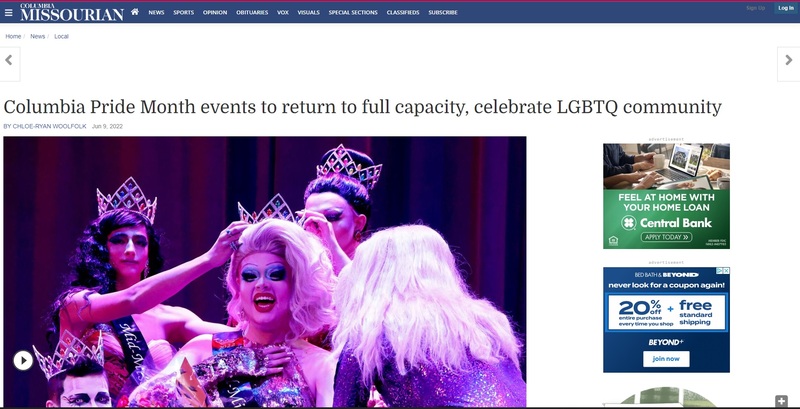 2022-06-09
2022-06-09Columbia Pride Month events to return to full capacity, celebrate LGBTQ community
This is a news story from Columbia Missourian by Chloe-Ryan Woolfolk. After two years of either cancellations or limited capacities, Pride Month events in Columbia will be returning to full capacity. Listed in the article are local events that people can attend now, with lists of fees and general details. -
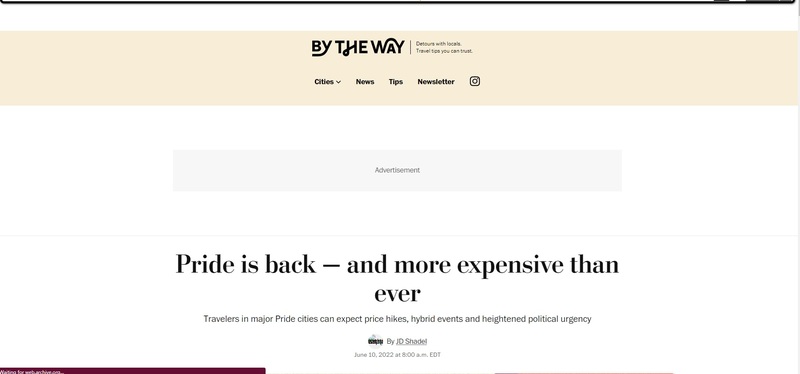 2022-06-10
2022-06-10Pride is back — and more expensive than ever
This is a news story from The Washington Post by JD Shadel. Due to the last two years of Pride Month remaining virtual due to COVID, some changes have been made along with it. Included in the changes since COVID are leadership ones in Philadelphia and London after allegations of their Pride leadership having racism and transphobia. The rising inflation has made it so summer travel is more expensive than before. Things like hotels, plane rides, and other modes of transportation cost more than they did before COVID. One change that has been brought about because of COVID is the rise of virtual events. Groups like NYC Pride, Capital Pride and Pride Amsterdam will have online streaming available. The NYC Pride March and the LA Pride March will be available on Hulu. Another debate that has changed since COVID are questions about "pinkwashing" in which a company will recognize Pride for profit, while not donating to any LGBTQ organizations. Some of the corporations in the past that have used Pride merchandise to sell things during Pride month while contributing to anti-LGBTQ organizations have been heavily criticized recently. Overall, COVID has contributed to changes in how Pride is celebrated. -
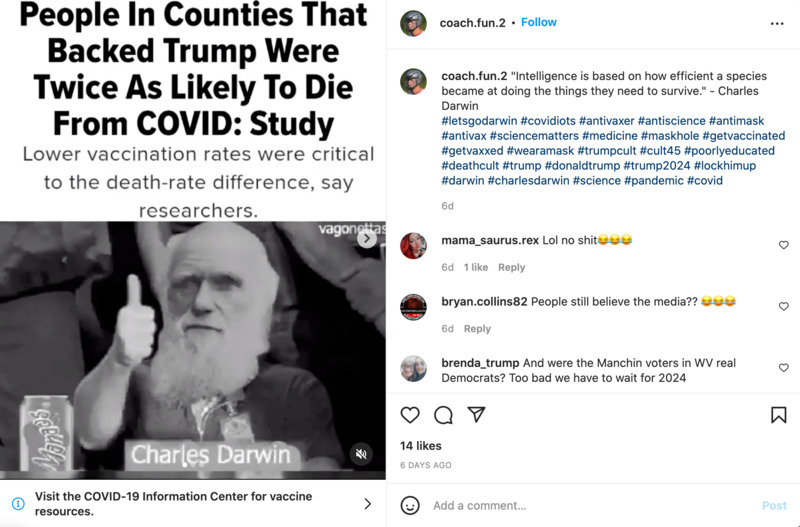 2022-05-22
2022-05-22People in counties backed by Trump were twice as likely to die from COVID: Study
This is an Instagram post by coach.fun.2. The study is not linked in the description, but I did find the article the title is referencing. The story come from the Huffington Post. It says that political affiliation is linked to vaccination rates, which some claim are what is making the difference between living and dying from COVID. Wealth and access to certain care are also taken into account. The study was from Brown and the study claims that states that went heavily for Trump had more cases of COVID deaths. -
 2022-05-28
2022-05-28Shanghai edges towards COVID reopening as Beijing plans to ease curbs
This is a news story from Reuters. After intense lockdowns, Shanghai is looking to reopen again. Shanghai officials urged continued vigilance, even though the vast majority of its 25 million residents live in areas that are in the lowest-risk "prevention" category. "Wear masks in public, no gathering and keep social distance," Zhao Dandan, deputy director of the Shanghai Municipal Health Commission, told a daily news conference. Similar measures are being taken in Beijing, where things are reopening there too, but with restriction. Starting on Sunday, shopping malls, libraries, museums, theatres and gyms will be allowed to reopen, with limits on numbers of people, in the eight of Beijing's 16 districts that have seen no community cases for seven consecutive days. -
 2022-05-26
2022-05-26From COVID-19 to shootings: Is mass death now tolerated in America?
This is a news story from The Associated Press. Just recently, there have been over one million COVID deaths recorded in the United States. The author of this piece asks if Americans have just begun to tolerate mass death. Racial and social inequalities are also cited, where the author claims that those of certain backgrounds are more likely to die sooner or more violently. The COVID deaths are then related to the recent shooting deaths, such as in Buffalo and in Texas. While the gun violence deaths are lower than the COVID deaths, the author uses this to show that little is being done for either to help lessen the amount of deaths. I don't agree with the author completely on this due to dying from COVID being very different from dying from a mass shooter. With COVID, people could pass it along unknowingly and get someone infected, as it is an asymptomatic spread. With a mass shooter, it is much less predictable and far more sudden. From what I have seen on my social media, I did not see anyone I follow really mark the 1,000,000 COVID death milestone, but many have expressed outrage over both the Buffalo and Texas shootings. I don't think the question should be whether Americans accept mass death or not, but of methods of prevention. Obviously, gun ownership won't solve all problems. The police that had guns were waiting outside the school as the shooter was slaughtering kids and adults. Though, one man with a gun, a border patrol agent, is who finally shot the mass shooter and killed him. This is more of a question of character, as well as how competent police forces are in these scenarios. I do not think the author made a fair comparison because protecting yourself from COVID to prevent death would be an entirely different process than protecting yourself from a mass shooter. While the goal of preserving life is the same, the methods differ. Outrage isn't an issue because I have seen people upset over death from COVID and mass shootings. The main problem I see is that people have trouble coming together on a solution. -
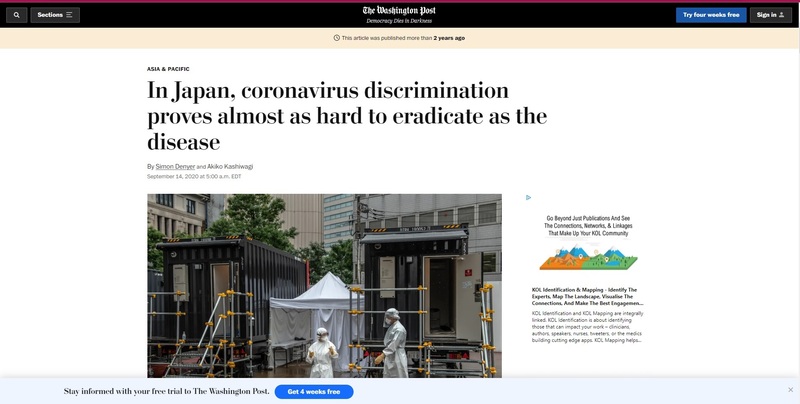 2022-05-16
2022-05-16Stigma During the COVID-19 Pandemic in Japan
During the COVID-19 pandemic, healthcare workers and patients in Japan suffered from the stigma. According to the article, “In Japan, coronavirus discrimination proves almost as hard to eradicate as the disease,” healthcare workers and their families are discriminated against as if they are “germs” that people need to avoid contact with. The patients of the virus are also stigmatized, and such a phenomenon of blaming victims has been seen many times throughout Japanese history. As this article represents, health care workers in Japan were stigmatized and discriminate against because of the potential risks of COVID-19 infections. According to Goffman, the greek definition of stigma “[refers] to bodily signs designed to expose something unusual and bad about the moral status of the signifier” (131). Nowadays, its definition has expanded to negative images of physical and social attributes and their interpretation in a social context. The stigma of healthcare workers in Japan is peculiar to this pandemic, and this could be because the situation overturned the expectations people had about healthcare workers. Healthcare workers are supposed to help people with diseases, but because of the pandemic, they are seen as the ones with higher risks of carrying the virus as they have more interaction with those who have been infected. As a result, people become afraid of interacting with healthcare workers, which made this job stigmatized. The article shows that Japanese people reject to interact with healthcare workers and their families during the pandemic. One of the common consequences of being stigmatized is that stigmatized people become separated from other people as they are treated differently. According to Goffman, “[the] responses of the normal and of the stigmatized that have been considered so far are ones which can occur over protracted periods of time and in isolation from current contacts between normals and stigmatized" (135). As Goffman illustrates, health care workers were stigmatized and separated from society at the beginning of the pandemic. Some people even believe that “the person with a stigma is not quite human” as Goffman states, which lead to an extreme reaction by people around health care workers. For instance, healthcare workers have been receiving death threats because other people see them as if they are the potential source of the disease rather than the same humans who are fighting the pandemic together. Such a reaction is similar to how children bully other children based on differences in attributes. One of the typical ways of bullying is to call someone “germs” and avoid interactions, which is the same as the situation in this article. This pandemic revealed our natural tendency of staying away from others who have negative attributes, which indicates that a pandemic is not an equalizer but a source of discrimination. Another factor that could have contributed to the situation in Japan is social pressure existing in the country. The article mentions that there is strong social pressure in Japan to follow coronavirus directives and to cooperate for stopping the spreading of the virus; if people do not comply, they are strongly criticized or blamed by other Japanese people. In addition, surveys have shown that compared to Americans or Britons, more Japanese people agree with the idea that “If someone is infected with the coronavirus, I think it is their fault” (Denyer and Kashiwagi). According to Fei, there are behavioral norms that are maintained by tradition, called “ritual norms” (97). This kind of norm is regarded as moral behavior by people of the community so that they follow the norms regardless of laws or punishments (99). Although Fei discusses Chinese rural society, such norms have been established in Japan as well because Japanese society developed as an agricultural society where people in a community need to cooperate with each other. There used to be a tradition called murahachibu, which means excluding those who break the rules from 80 percent of social activities in the village with the exception of funerals and fires. Even though this practice is rarely seen in modern society, people still have a strong pressure to behave for the sake of society in order to maintain harmony. For example, Japanese people still feel obligated to wear masks after vaccines have been promoted even though there is no rule or punishment for not wearing masks. This feeling may occur because they believe it is moral or correct to refrain from doing something that possibly spreads the virus. Healthcare workers were not the only people who suffered from stigma, but COVID-19 patients were also blamed for their behavior that possibly contributed to their infection. In the article, a Japanese psychology professor mentions “a low tolerance for uncertainty” in Japanese people, indicating that they blame the patients to reduce their own fears derived from the uncertainty of the pandemic. This implies that COVID-19 patients become scapegoats for the pandemic itself. In the reading, Trauner writes that “the general acceptance of the germ theory in the 1880’s did little to dispel the popular belief that epidemic outbreaks were directly attributable to conditions within Chinatown” (73). This indicates that when people are uncertain about something scary, they try to identify what or who causes that disease or threat. Although people know that coronavirus is the cause of this pandemic, most people are afraid of germs and viruses because they are invisible. The article also demonstrates some cases of blaming victims in Japanese history, including leprosy patients, survivors of the 1945 atomic bombings, and evacuees of the 2011 Fukushima disaster. Such diseases and disasters involve complicated factors, so it is difficult to blame the causes directly. Therefore, individuals tend to blame patients or carriers of the virus during the pandemic instead of blaming the virus itself because they are visible and easy to avoid. References Erving Goffman (1976) “Stigma” :Chapter 10 “Selections from Stigma” Fei Xiaotong (1947) “From the Soil: the Foundations of Chinese Society” Joan B. Trauner, (1978) “The Chinese as Medical Scapegoats in San Francisco, 1870-1905 Simon Denyer and Akiko Kashiwagi (2020) “In Japan, coronavirus discrimination proves almost as hard to eradicate as the disease” -
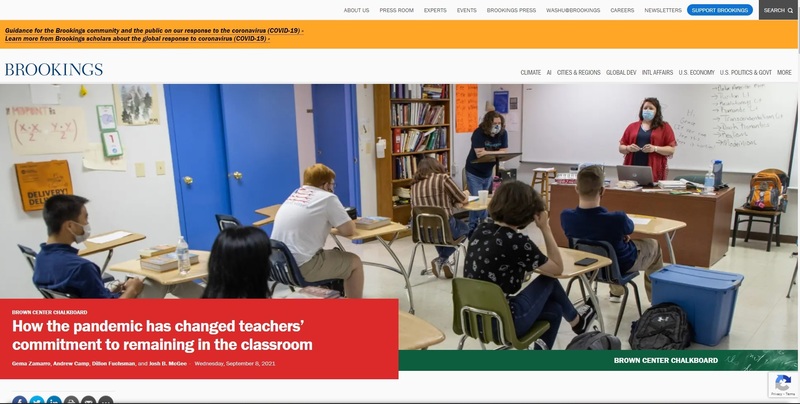 2021-09-08
2021-09-08How the Pandemic Has Changed Teachers' Commitment to Staying in the Classroom
According to the article, there was a 16% national turnover rate for teachers before the pandemic. A survey given in January 2021 shows that almost 25% of teachers stated that they wanted to leave teaching. Pre-pandemic surveys and surveys given during the pandemic also show that less teachers believe that they will stay in education until retirement. The pandemic has required that teachers maintain the same responsibilities, while also piling on constant communication with parents (even without a response), social-emotional lessons, plans for asynchronous and synchronous learning, teaching students virtually and in-person at the same time, keeping up with changing health and safety regulations, and having to deal with increasing behavior issues. -
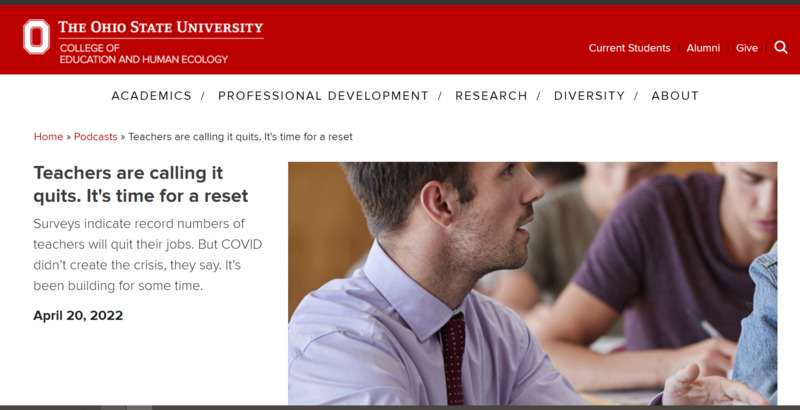 2022-04-22
2022-04-22Teachers Are Calling It Quits
Before the pandemic, teachers already experienced a job where they are overworked, often underpaid, and underappreciated. This article details rising frustrations by teachers during the pandemic and the subsequent leaving of many people from education. -
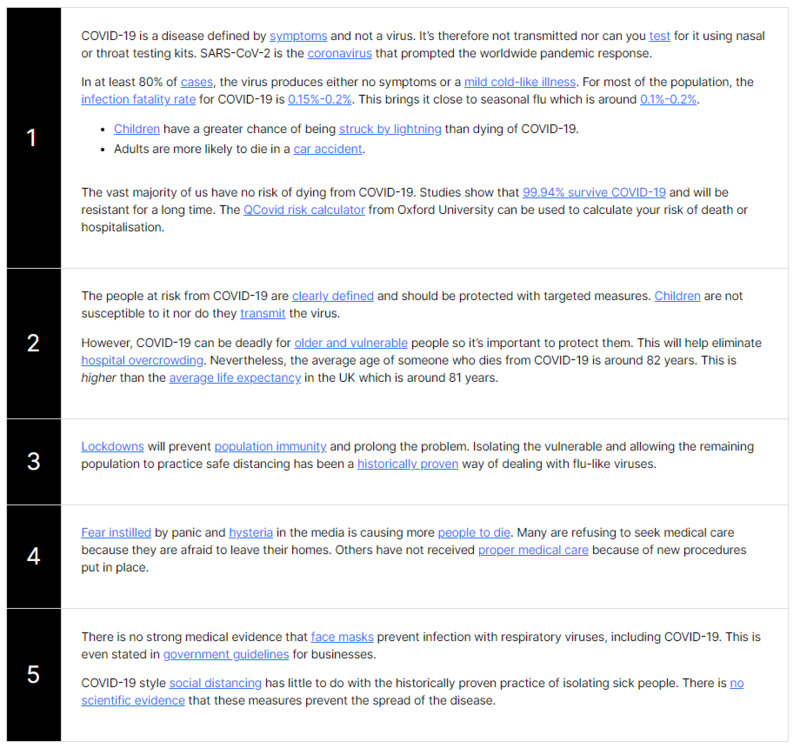 2022-05-10
2022-05-10Evidence Not Fear Key Facts Chart
The item is a chart from evidencenotfear.org. It can be found on the homepage. This chart can be found under the “key facts” section and explains the information that is claimed to be from experts in epidemiology, microbiology, and virology. The key facts section contains information that is immediately concerning to me. Some of the statements that are the most concerning to me are that children cannot transmit the virus, face masks can create negative health effects for the person wearing them, and more people have died from the panic of COVID-19 than the virus itself. The chart contains links, which I assumed would provide evidence and research to back up the claims. However, each link leads to an archive of news articles that are related to that topic. The message of this item is that the fear of COVID-19 has been worse than what the virus can actually do. This is seen through the explanations of face masks causing complications, lockdowns preventing herd immunity, and children cannot being affected by it. It tries to persuade the reader by providing links to several different news articles supporting the claim. However, the news article that they are using as support does not provide sources either. -
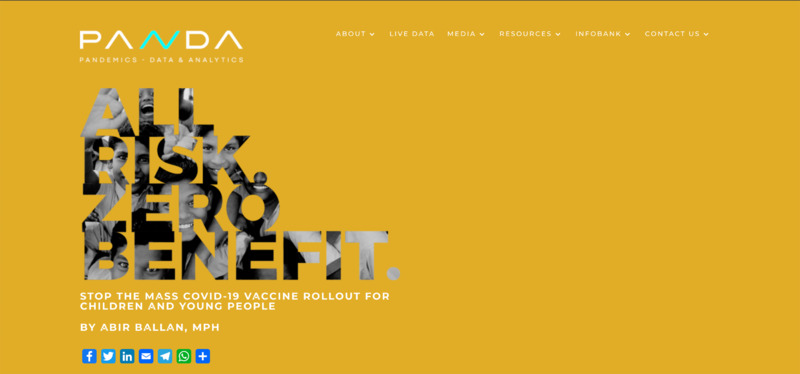 2021-06-25
2021-06-25Pandata falsehoods putting children at risk
The attached link is to an anti-covid vaxx website, specifically about not vaccinating children. The first thing you see is a list of 10 reasons not to vaccinate children, followed by a video. The main message is vaccines for children are not safe. (Which I would personally like to point out is false.) They are pushing the idea that vaccines are coercive and dangerous. The video is titled “What about the kids?”, and the page it’s listed on is titled “All Risk Zero Benefit.” First, we can look at the title of both of these to see tactics of persuasion. “What about the kids?” Exactly, what about them? This creates an emotional appeal to listen to the message, surely everyone would care about kids, and surely you want the best for them? “All Risk Zero Benefit”, a short title, to the point, definitive word choice. There is no room for argument with “zero benefit”. The video itself flashes between different news outlets and interviews with ‘experts’, Doctors. There is the continued tactic of “The other doctors don’t want you to know this”, or “The government is trying to control you”. This is truly stupid and disgusting. If you watch the video, all the clips are from either Fox ‘news’, The Epoch Times, or from something called Brees Media. Fox and Epoch are both conservative right-wing outlets. I looked into Brees Media, as I hadn’t heard of it before. It is a former BBC employee who now created a company that teaches people how to create media content. She (Anna Brees, the owner) has several tweets and Instagram posts that push this anti-vaxx mentality. People tend to trust BBC, at least more so than other news sources, so by continuing to use the Ex-BBC in her bios on everything it begins to create a buy-in for people. -
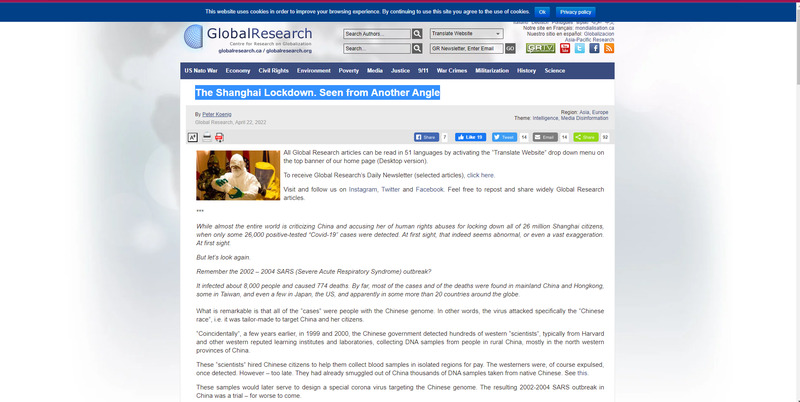 2022-04-22
2022-04-22The Shanghai Lockdown. Seen from Another Angle
This is a screenshot of an article from globalresearch.ca about looking at the most recent Shanghai Lockdown. Yet, the article does not talk about the Shanghai lockdown until maybe halfway through the article. It goes on a tirade about how the 2002-2004 SARS outbreak went after the "Chinese race" and how it became an early trial for China before COVID. Then the author states that China has "mastered the disease" and managed to reopen its economy by the end of 2020, which leads to the conclusion that China's economic growth hardly suffered during the newest outbreak. The author asserts that China will surpass the U.S. economy in 3-4 years and then launches into a world history lesson about Cold War politics. The author tends to wander in the article, going from pandemic skepticism on vaccines sterilizing women, being lied to the government, or having HIV ingredients. Then somehow, Ukraine has virus labs...I don't know. Somehow, Russia is involved in this article, but I'm not sure why. I don't know how this is supposed to persuade its audience because the author goes all over the place with his points. I suppose skeptics will like the fact that the vaccine is being questioned here? Personally, I don't even understand why skeptics would want to read this because I think they would lose even more brain cells from just trying to read it. I think this article is just a gigantic mess and it makes my brain hurt. I find myself just not understanding a single thing that is being written in this article. I don't understand why anyone would even understand or like this article. It literally makes absolutely no sense and there are even typos in it. The look of this website and article makes me want to run my virus protection at least three times because I feel like they're going to infect my computer with a Trojan horse. -
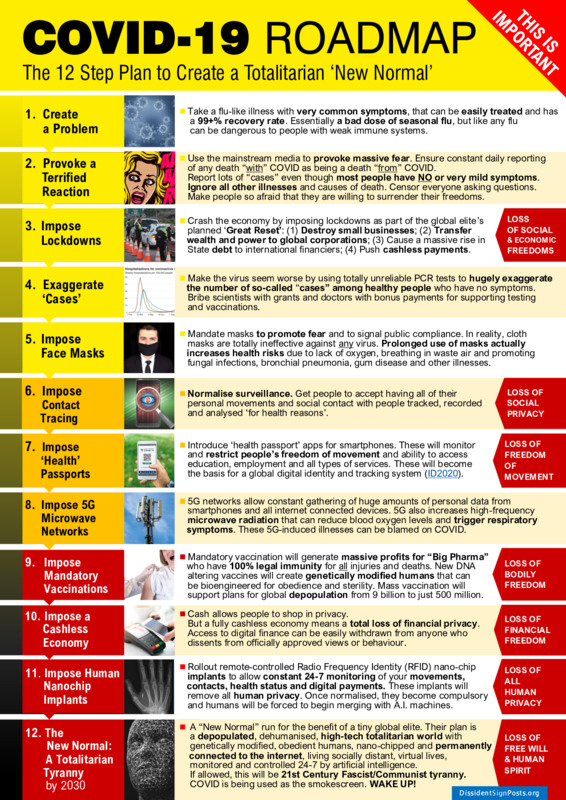 2022-05-09
2022-05-09I can't even make this up anymore
First off, I do not agree with the attached pdf to this story. When I first looked at this awful website, and saw that they had FREE DOWNLOADABLE PRINTS, I immediately sighed because this is the type of stuff that's turning people AWAY from getting a vaccine. These people are the reason why people can't trust "media". It is also very obvious that these people have never taken a history or any type of political science class in their lives. Let's analyze a little bit of what they say. First off, in their step 1 of "create a problem" they compare COVID-19 to something like the flu. Given, I'm sure people have died from the flu. I mean, the influenza pandemic was a thing in 1918. Also important that they even wore masks then! Their step 2 is "provoke a terrified reaction". What I'm getting from this is, we shouldn't be worried. But we should. Any pandemic should be worrying. I can also guarantee you as well that these people didn't give a shit when the AIDS/HIV Epidemic was literally killing so many queer people at an alarming rate, and wasn't addressed until 6 years later after it started. Anyways, the steps that talk about "contact tracing" and "health passports" things are interesting. They talk about surveillance, but surveillance has been happening since the dawn of time. I'm sure muslim's everywhere in the United States could talk more about surveillance than I could as a white person. Health passports? You have to have certain vaccines to attend public school or even a public university. Also, actual passports are a thing. You know, the thing you need to tell other people who you are and where you're from when you visit their country. I'm going to jump to step 10's "Impose a Cashless Economy," anyone that has ever handled cash during a job knows how gross cash is. This pamphlet must've been when the pandemic first happened, because that's when my last job couldn't take cash because we were too afraid to touch anything. Now knowing the information I know now, a lot of places take cash now. But also, people are gross. Half of the time, people are sneezing into their hands or not washing their hands and come out of the bathroom and go to pay and give you cash. Don't even get me started on people pulling money out of their bras. Throughout this entire pdf, they talk about the elite. Which is probably the only thing I agree with them because the rich got richer during the lockdown and even made prices higher. This type of propaganda could be harmful to someone that was already on the fence about vaccines, but the fact that this information is out there instead of the actual science based truth is harmful. It uses familiar words from history to persuade people to not get the vaccine. -
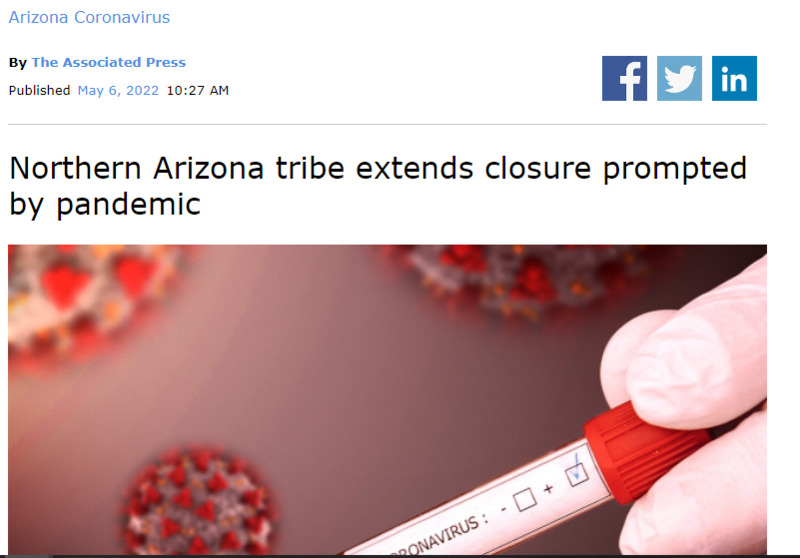 2022-05-06
2022-05-06Northern Arizona tribe extends closure prompted by pandemic
This is a news story by the Associated Press. The Havasupai Tribe, a tribe located in Northern Arizona, has closed its reservation through the 2022 tourism season. The reservation has been known for its large waterfalls. Other repairs are needed in the reservation too, including trailheads, camp grounds, and lodges. -
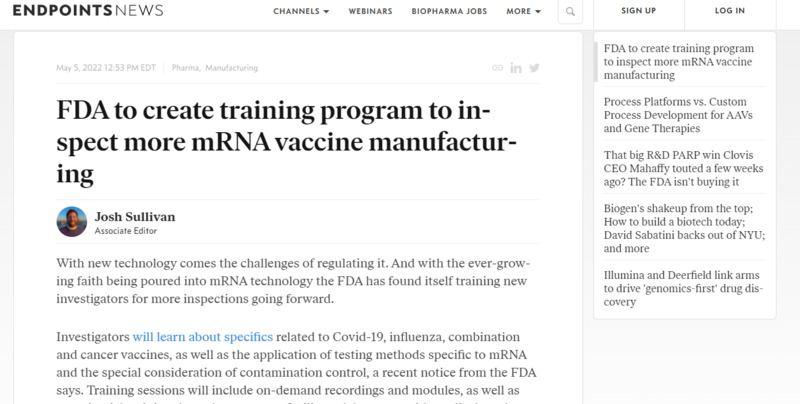 2022-05-05
2022-05-05FDA to create training program to inspect more mRNA vaccine manufacturing
This is a news story from Endpoints News by Josh Sullivan. With new faith being poured into mRNA vaccines, a new training program is being developed to help with the manufacturing process. This program will entail learning the application of mRNA vaccines, as well as laboratory training. BioNTech, Pfizer’s partner in its Covid-19 vaccine efforts, recently revealed that it is paying Matinas BioPharma to gain exclusive access to its lipid nanocrystal drug delivery platform for the oral delivery of mRNA. It also was one of the first companies to announce plans for the massive mRNA manufacturing sites that are being built. BioNTech plans to piggyback off the success of the technology by pivoting to work on malaria vaccines once the Covid-19 pandemic has subsided. -
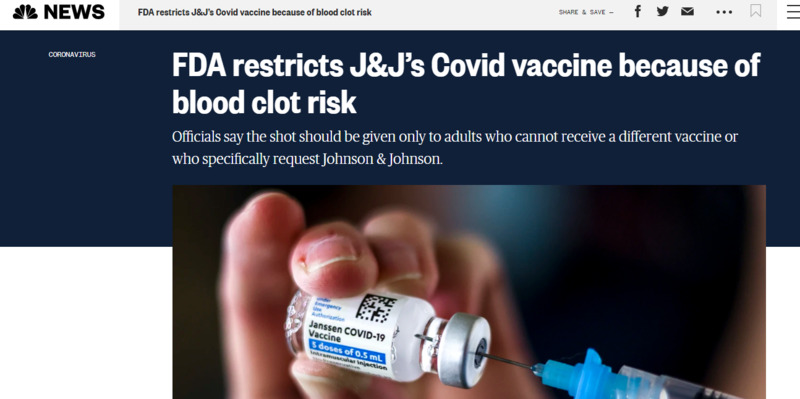 2022-05-05
2022-05-05FDA restricts J&J’s Covid vaccine due to blood clot risk
This is a news story from NBC News by The Associated Press. Due to new findings, the J&J vaccine has been restricted by the FDA due to blood clot risks. It is not to be given to anyone unless they can't receive a different vaccine. Americans are now recommended to only be using Pfizer or Moderna shots instead. -
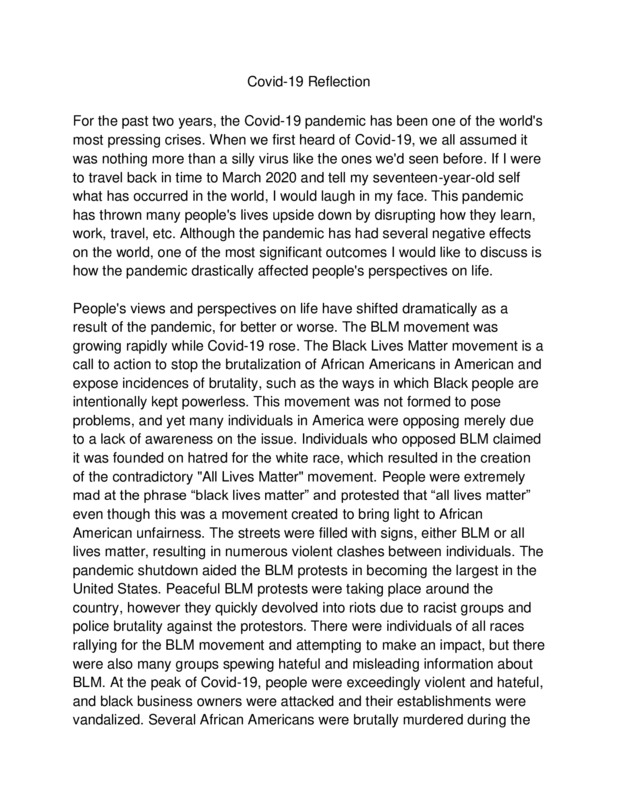 2022-04-27
2022-04-27Minorities & Covid-19
This text is about the BLM movement & how I believe Covid-19 aided the movement. -
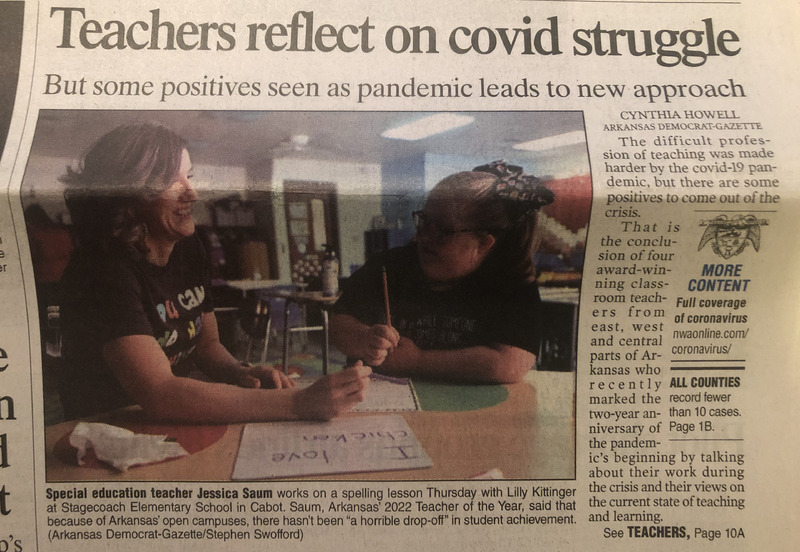 2022-04-03
2022-04-03Teachers reflect on covid struggle
This article details the reflection of a few Arkansas teachers as we reach two years since the beginning of the pandemic. The teachers highlight the drastic changes not only in safety precautions, but also the adjustments in order to provide meaningful learning in an entirely new landscape. Many of the teachers reported excitement at the prospect of a return to normalcy, however they desire some aspects of the pandemic adjustments to remain in place. Flexible learning, new and creative ideas of conveying topics, and more individualized learning methods have seen an increase in retention of material, which is fundamentally what education is all about. The teachers would also like an end to the stigma surrounding the covid learning adjustments, primarily the notion that education is now "entirely computer based". This notion is quite the contrary, according to educators, rather the new methods not only encourage flexibility and invite individualized learning but also promotes computer skills which will be vital for adulthood. I think this article is interesting because it highlights the fundamental change covid has made and continues to make on society. In order to promote public health and safety, teachers were forced to adjust and were forced to rework how they educated. This compelling of behavior has rendered some positivity. I think it is critical that children are able to have the safest and most effective education, and while covid seems terribly negative, there is a small glimmer of improvement from the pre-pandemic world. This article was published in the Northwest Arkansas Democrat Gazette. -
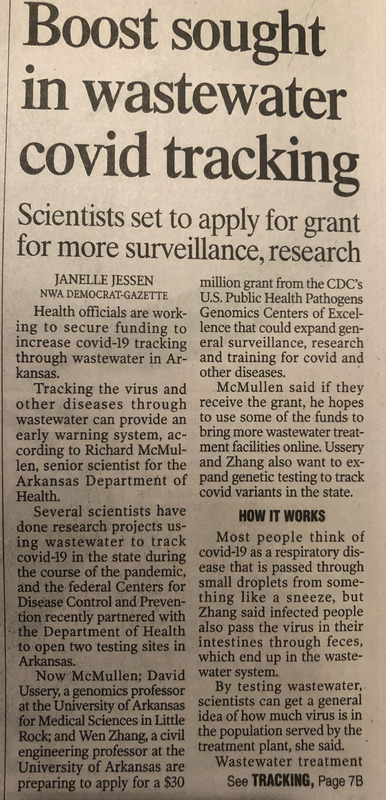 2022-04-10
2022-04-10Boost sought in wastewater covid tracking
This is a news article detailing the work of health officials and scientists and a new program of tracking COVID in wastewater through a program at the University of Arkansas. The Arkansas Department of Health hopes this new program will allow scientists and health officials to receive an early warning about a potential surge in the spread of COVID and take appropriate measures to minimize the potential damage. If successful, the University and the Arkansas Department of Health hope to apply for a $30 million dollar grant from the CDC to implement the process across the country and perform more research. The basic premise is to collect a sample of wastewater and test for COVID-19 and thereby generally derive if the community is increasing or decreasing in cases. While the program cannot give a specific number of afflicted individuals, it is suggested that understanding COVID in wastewater will give health officials a better understanding of those who test at home and therefore do not report on state-wide numbers. This article is fascinating, I think, because it demonstrates a rapid growth in scientific ideas to combat the pandemic since the dawn of COVID in America. Indeed, COVID has permeated every aspect of our lives, so it is only natural to derive a solution from even the most mundane aspects of humanity. It would seem impossible to gain a greater understanding of COVID from something such as wastewater, but the pervasiveness of COVID has encouraged study such as this. I think the ultimate mission of this program is valuable. When I had COVID at the start of February, I took an at home test and therefore I was not reported as a number in the statewide totals. This article really made me think about whether or not we as a society really know how many people are afflicted with COVID and just how serious the pandemic is or not. This article was published in the Northwest Arkansas Democrat Gazette. -
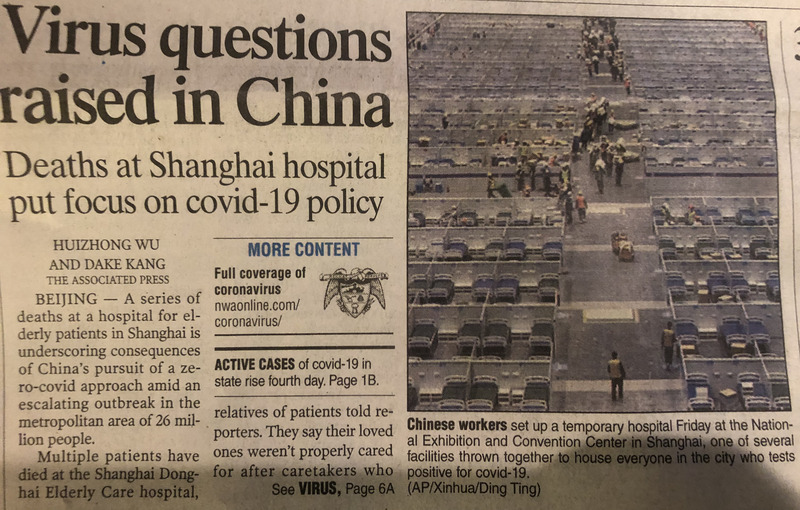 2022-04-10
2022-04-10Virus Questions Raised in China
This is a newspaper article detailing the repercussions of China's "Zero-COVID" policy and the impact it has on families. The story reports a rise in deaths at a Shanghai hospital for the elderly and a further rise in COVID cases in Shanghai. Extensive regulations at the hospital have forced a decrease in hospital staff to manage the many elderly patients suffering with COVID. The article details that a significant number of patients are asymptomatic, yet are placed in strict quarantine to minimize the spread. There are reports of several patients dying due to a lack of proper care from medical professionals who are forced to be absent from the patient as they are locked in strict quarantine. The article further suggests that perhaps China's "Zero-COVID" policy approach is creating far more significant damage to individuals and their families than good. I think this article is interesting because it details an alternative approach to U.S. policy which has maintained a very relaxed and hands-off attitude for a majority of the pandemic. While many states took arguably excessively extreme measures, many states were lax on quarantine, mask enforcement, lockdown protocols, etc. Furthermore, China's policy seems a bit excessive, so perhaps the right answer lies somewhere in the middle. This Article was published April 10th, 2022 in the Northwest Arkansas Democrat Gazette. -
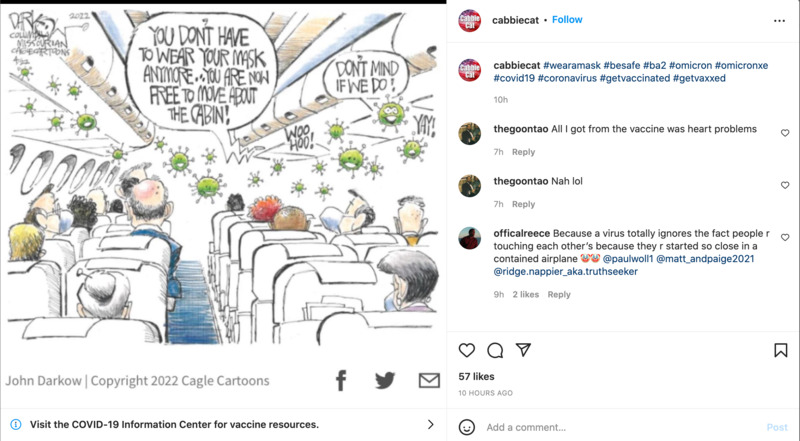 2022-04-22
2022-04-22Wear a Mask
This is an Instagram post by cabbiecat. This user posted a comic that is referencing the recent lift on plane mask mandates in the United States. The comic itself is suggesting that by people removing their masks that COVID will spread easier. -
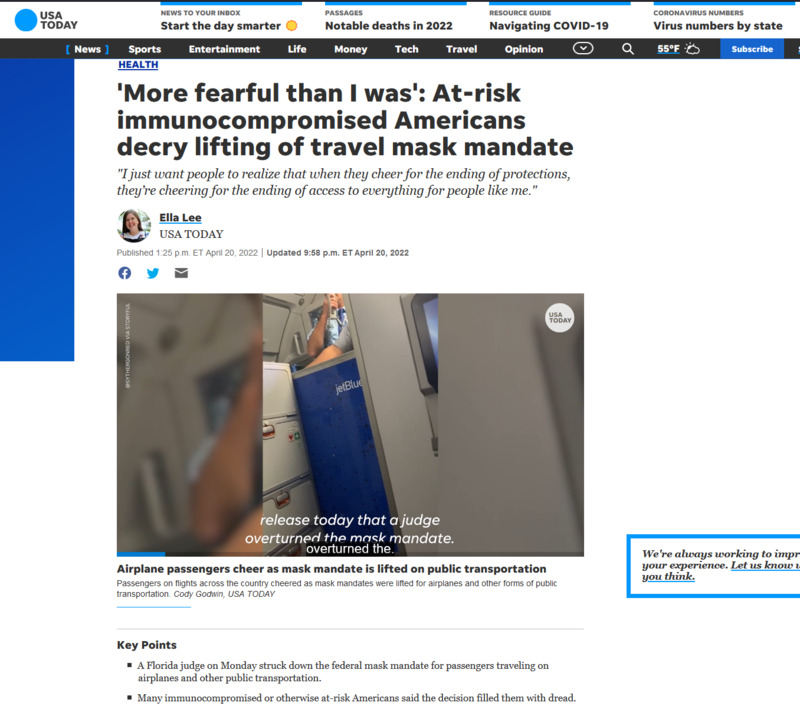 2022-04-20
2022-04-20'More fearful than I was': At-risk immunocompromised Americans decry lifting of travel mask mandate
This is a news story from USA Today by Ella Lee. This is about pushback against the lifting of the mask mandate, as it has made immunocompromised people afraid. "Being immunocompromised, it's already a huge risk getting on a plane with everybody masked," said Derek Schmitz, 17, of Oxford, Alabama, who takes immune-suppressing arthritis medication and has to fly for work as a disability advocate. "Now, knowing that I most likely will be one of the only people on a plane with a mask is petrifying." After the lift of the mandate for planes and other public transportation was voided, ride share companies like Uber and Lyft have followed suit in removing their own mandates. "I was angry and felt hopeless," said Erin Masengale, 33, who has multiple autoimmune diseases treated by immunosuppressants. "I just want people to realize that when they cheer for the ending of protections, they’re cheering for the ending of access to everything for people like me." Under the strict definition of immunocompromised, only about 3% of Americans fit that definition. Though, the author mentions that disabled and chronically ill people, a much larger population, also face risk with the lifted mandates. The question I have for people that read this is: is it worth it to keep the mandate even though it caters to a relatively small population? Would it be wiser for people already with these ailments to mask on their own instead of mandating it for everyone else, especially if overall cases and hospitalizations are lower? These are the questions I have after reading this article. I am not against people masking when they see fit, but it is clear that these mandates have worn many people out. -
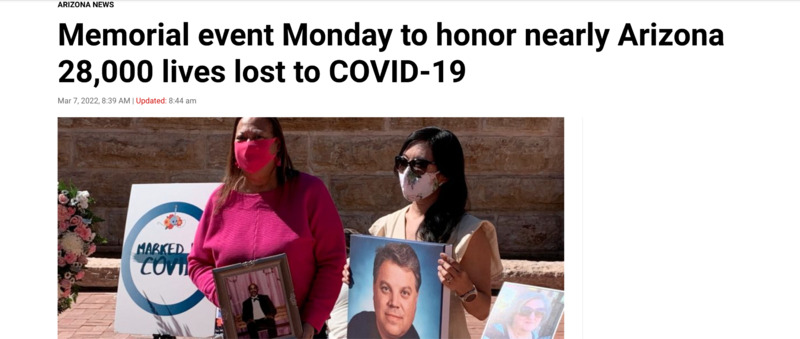 2022-03-07
2022-03-07Memorial event Monday to honor nearly Arizona 28,000 lives lost to COVID-19
This article is about the Covid Memorial event held at the Arizona Heritage Center in Tempe on March 7, 2022. The event was organized by the Arizona Historical Society, the nonprofit organization Marked By COVID and the COVID Memorial Quilt project. The Covid Memorial Quilt is on display until August, 2022 at the Arizona Heritage Center. -
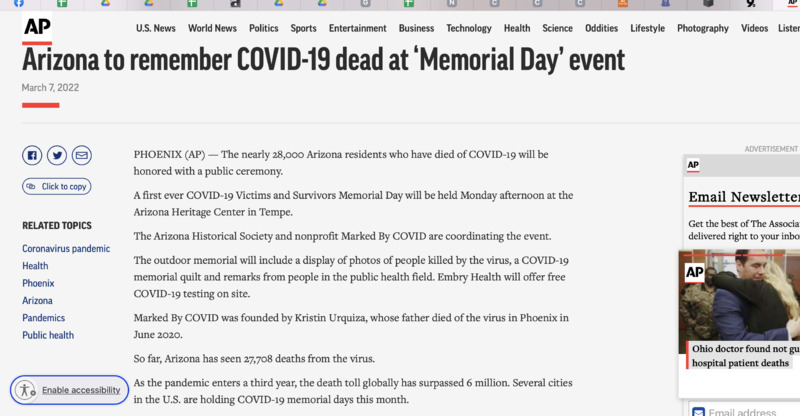 2022-03-07
2022-03-07Arizona to remember Covid-19 Dead at "Memorial Day" event.
This article is about the Covid Memorial Quilt exhibit at the Arizona Heritage Center in Tempe. The Arizona Heritage Center is a museum of the Arizona Historical Society. This article describes the quilt and the memorial event held on Monday, March 7, 2022. The event was sponsored in part by the non-profit group Marked by Covid which honors those who have died of Covid 19. Almost 28,000 Arizonans have died of Covid as of March 7th. -
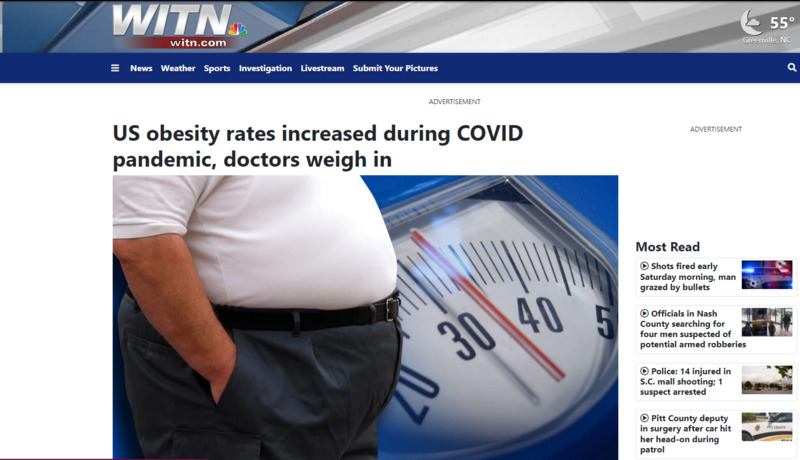 2022-04-05
2022-04-05US obesity rates increased during COVID pandemic, doctors weigh in
This is a text story from WITN by Justin Lundy. This is a news story on the increase in obesity rates since COVID started. In a study published by the American Journal of Preventative Medicine, the average BMI in US adults increased by 0.6% between March 2020 and March 2021. This increase happened even as exercise participation rates increased by 4.4%. -
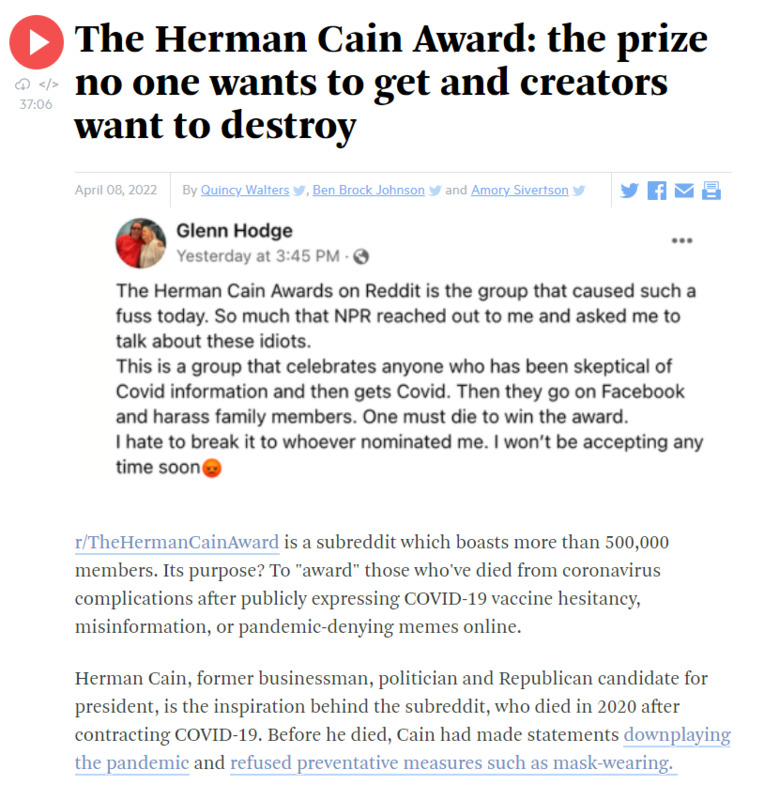 2022-04-08
2022-04-08The Herman Cain Award: the prize no one wants to get and creators want to destroy
This is a news story from WBUR by Amory Sivertson, Ben Brock Johnson, and Quincy Walters. This is an interview that has been transcribed about the subreddit r/TheHermanCainAward. This subreddit has over 500,000 members. It is named after Herman Cain, a former businessman and Republican presidential candidate, who died in 2020 after getting the Coronavirus. One of the moderators, "Hammy", says that specific anti-mask and anti-vaccine people are featured on the subreddit in an attempt to influence, and in turn, take what is posted publicly, and throw it back in their faces. In order to get an "award" on the subreddit, one has to die. Nominations are for those that go to the hospital. The subreddit makes sure that all information is verified so people cannot call it "fake." They also go to lengths to black-out names, faces, and places in order to protect privacy. Though, even with attempts to make things anonymous, people are still found out. The moderator "Hammy" also does not wish to include their real name in this interview for fear of harassment. Glenn, someone that got featured in the subreddit, was also in this interview to explain his reasoning. Many of his doubts stem from the way the government has been handling it, in addition to the producers of the vaccine themselves asking for more boosters after the initial vaccine, which to him, doesn't seem normal for a vaccine. Glenn also recounts getting lots of harassment on his own Facebook page after getting featured in the subreddit, saying it isn't treatment their own kids should have to see, like people cheering on his death. Despite being vaccinated, "Hammy" contracted "long COVID." Glenn ended up with COVID pneumonia. -
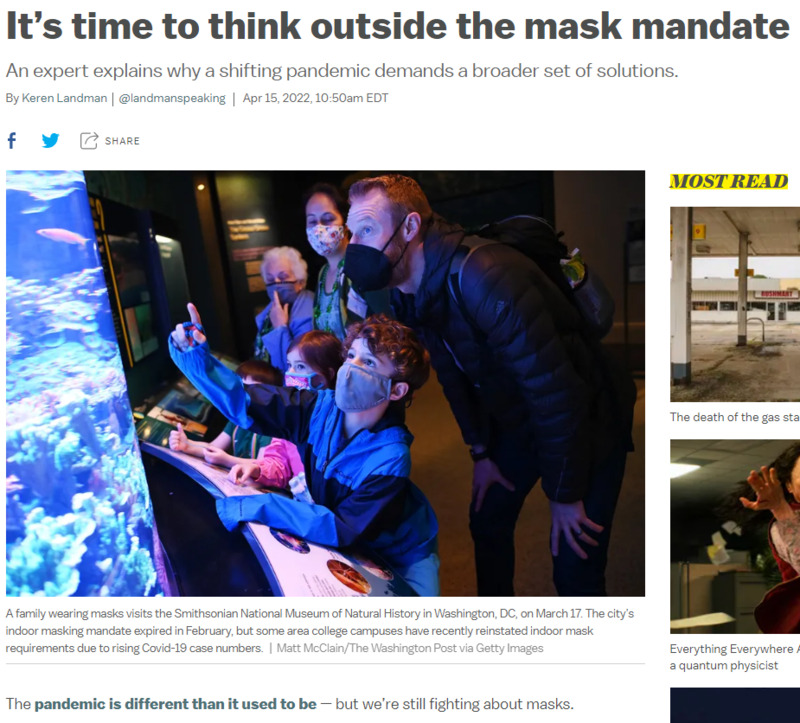 2022-04-15
2022-04-15It’s time to think outside the mask mandate
This is a news story from Vox by Keren Landman. The author interviews an epidemiologist on new solutions to tackling the virus that do not require shutting things down or forcing masks. The epidemiologist, Jennifer Nuzzo, says that instead of forcing masks, make things more equitable with having rapid testing more readily available, in addition to vaccines, so that people can continue on with their lives without as much interruption. She believes that masks and lockdowns are okay short-term when not much is known about the virus, but since we know more now, and have more testing, vaccines, and treatments, that we do not need these things. Luzzo thinks we should focus on low-access places so that more people have a chance of protecting themselves. -
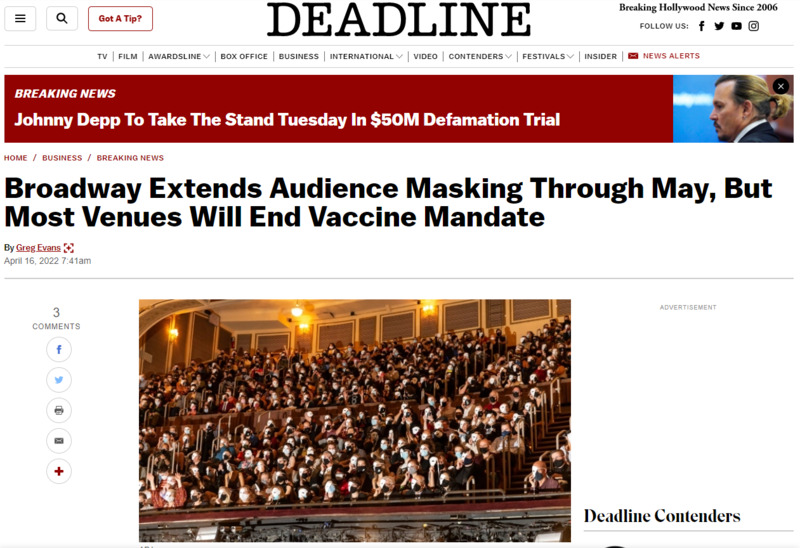 2022-04-16
2022-04-16Broadway Extends Audience Masking Through May, But Most Venues Will End Vaccine Mandate
This is a news story from Deadline, written by Greg Evans. This story is about Broadway taking away the vaccine mandate, but keeping the mask mandate through May in their venues. It says that The Broadway League has required all 41 venues to mask up through May 31, but vaccination status will not be checked after April 30. Since the beginning of COVID, Broadway has hired extra staff to check vaccination status at the doors of their venues. -
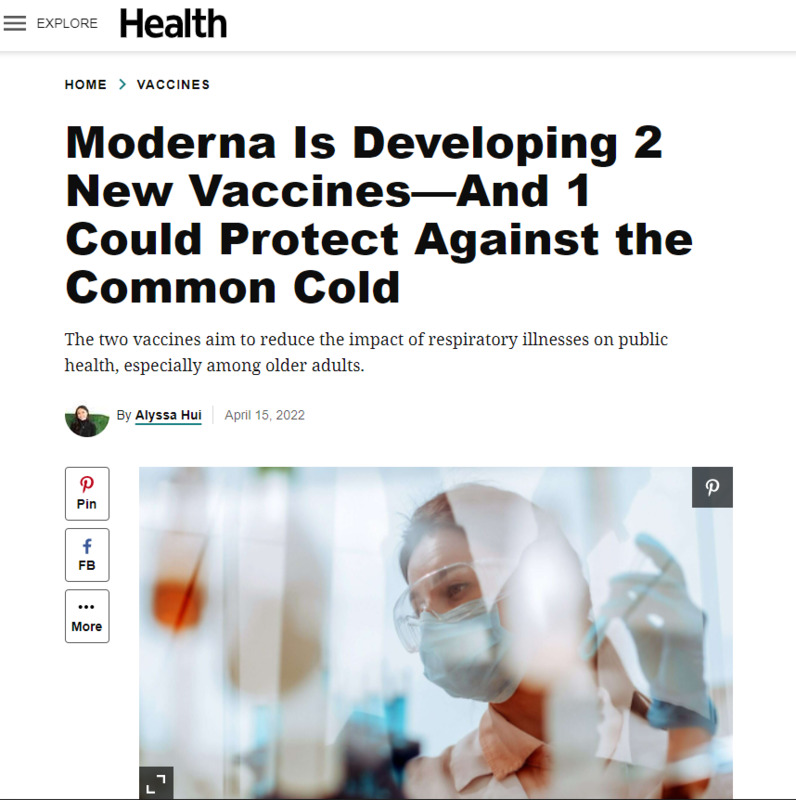 2022-04-15
2022-04-15Moderna is Developing Two New Vaccines-- And One Could Protect Against the Common Cold
This is a news story by health.com written by Alyssa Hui. This story is about Moderna expanding its biotechnology into creating new vaccines using similar techniques the COVID vaccines have used. One of these vaccines will be used to help combat RSV, which is a virus that hospitalizes an average of 177,000 adults per year, according to the CDC. Another illness that Moderna is looking to use vaccines against are four other endemic human coronaviruses. Moderna does not claim they offer 100% guaranteed protection, but that they can benefit people greatly for reducing chances of contracting certain illnesses. Moderna wants to ensure that the vaccines are safe and will go through testing procedures to do so. They are hoping that there will be more uses for mRNA style vaccines in the future, and not just for the coronavirus. -
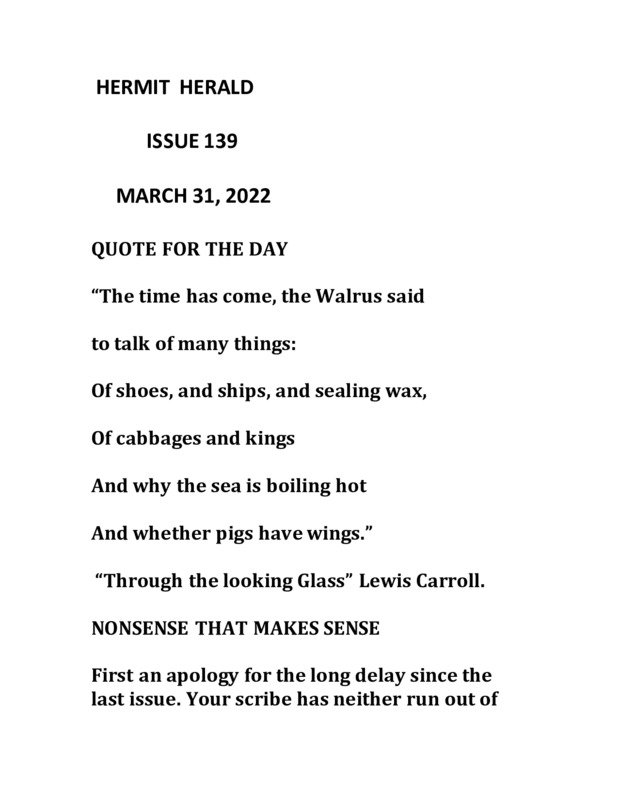 2022-03-31
2022-03-31HERMIT HERALD, ISSUE 139
Putin's invasion of Ukraine analogous to "The Walrus and the Carpenter" -
 2022-04-11
2022-04-11A New Stanford Study
This is an Instagram post by newsrescue, which is a news site that claims to bust "fake news." The study that this news story is referring to is one on spike proteins, which found that the vaccinated and unvaccinated had roughly the same amount of spike proteins in their blood. This news story is designed to show that the vaccines may not be as effective as they are claimed to be. -
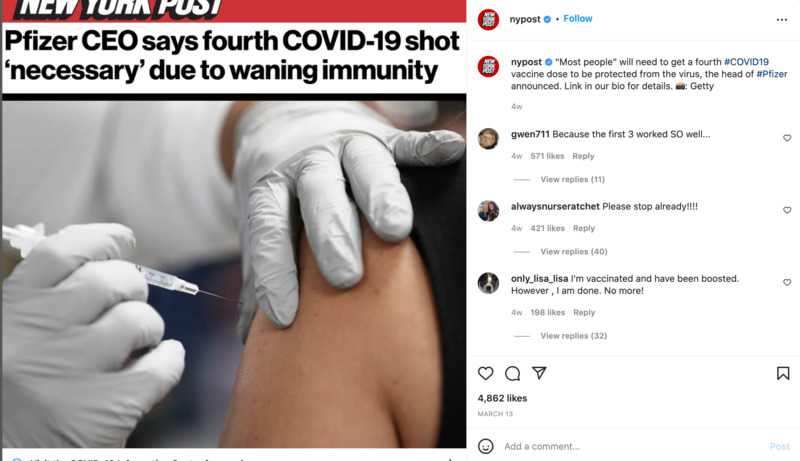 2022-03-13
2022-03-13Pfizer CEO says fourth COVID-19 shot 'necessary' due to waning immunity
This is an Instagram post by the New York Post. This is of a news story in circulation currently regarding vaccines. Below, there are commenters expressing doubts in the effectiveness in the vaccines. Of note, one commenter says that they have already been vaccinated and boosted, but do not want anymore shots. Another is asking for it to stop already. To me, this shows some of the overall fatigue some are having with the vaccines themselves.
